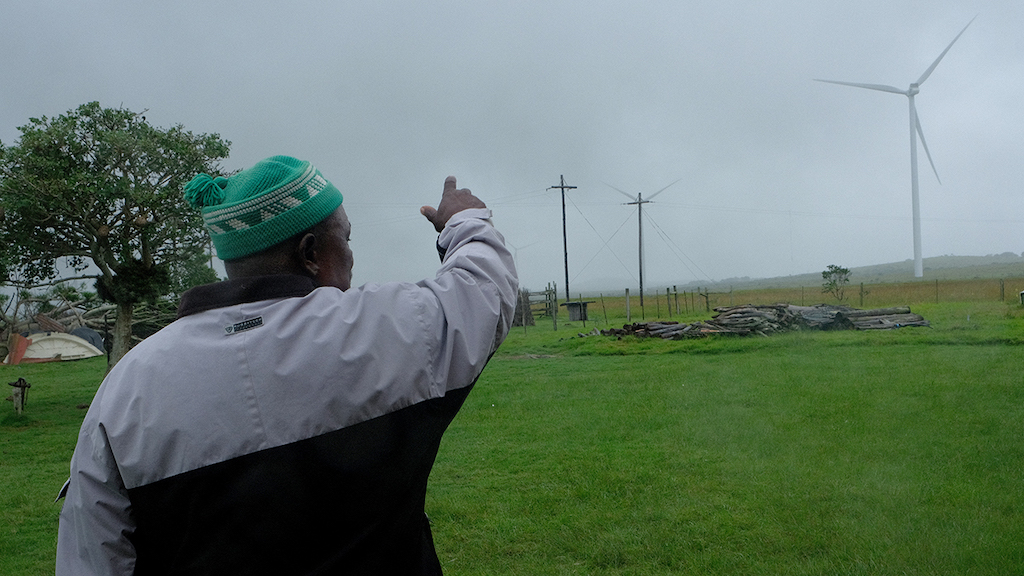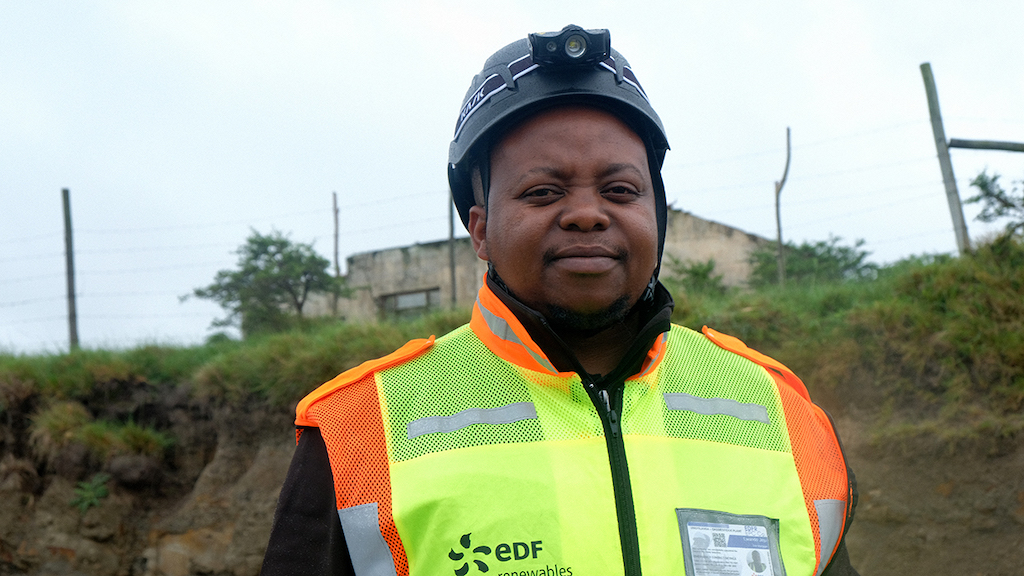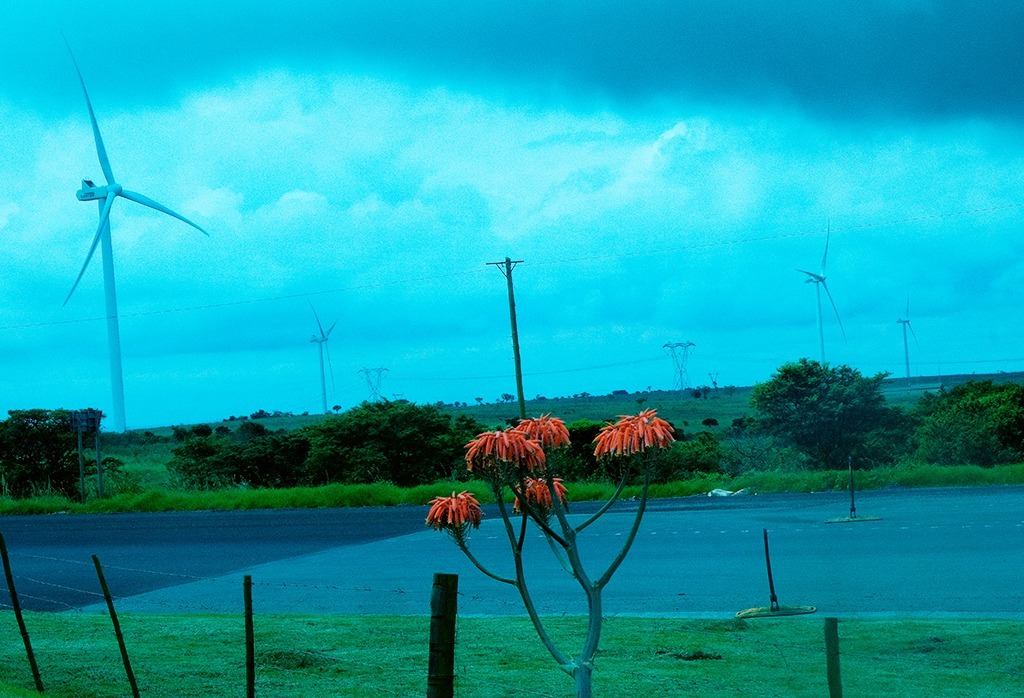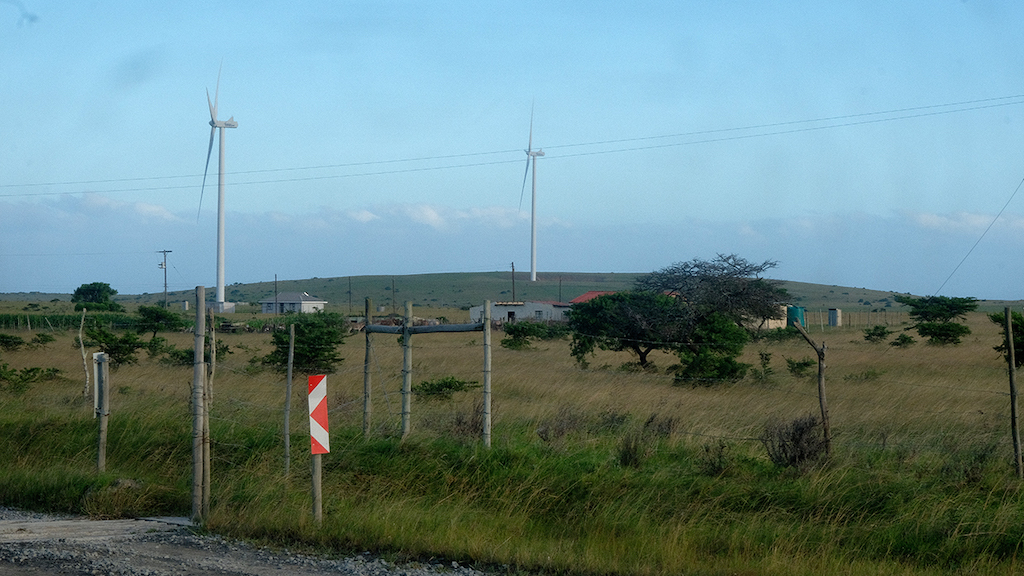
15 Apr Whose land, whose power? South Africa’s renewable energy conundrum
Wind farms feed power into the national grid, but the stories behind the land deals are rarely told. Tunicia Phillips investigates a case study in the Eastern Cape
Photos and multimedia: Dianah Chiyangwa

Windy deals: A member of the Uncedo Lwethu family trust points to the wind turbines on the Wesley-Ciskei Wind Farm
Deep within the Eastern Cape province, the Wesley-Ciskei Wind Farm offers a unique lens into the complexities of South Africa’s energy transition and its intersection with land ownership.
While most wind farms in the province are situated on white-owned private farmland, the Wesley-Ciskei project involves 11 black landowners in the former Transkei and Ciskei homelands, sites of land dispossession and racial segregation during the apartheid era.
The birth of the wind development some 15 years ago was led by a local professional who grew up on Riverbank Farms near Hamburg. Zukisani Jakavula, along with an international partner, painstakingly worked to identify and certify beneficiaries of deceased estates tied to 12 families and 11 properties. The deeds for these properties had last been updated in the late 1800s.
“We were not dealing with one owner here, we were dealing with generations and generations. The idea was for them to form 11 family trusts and have those trusts for beneficiaries. That took quite a while,” he said.

Community shareholding
Jakavula is a founding partner of the project, a family beneficiary through his parents’ ownership and a shareholder in a community shareholding that was acquired by the local farming cooperative in the wind farm, situated in the village of Nyulutsi, between East London and Port Alfred.
Just Energy, a section 21 company established by Oxfam for the development of wind farms involving community ownership, signed leasing agreements with the landowners in 2012. In 2015 the project was acquired by the current owner, EDF Renewables, a wholly owned subsidiary of the French utility EDF Group.
“Just Energy had to do a lot of work to convert deceased estates into functional family trusts with the descendants as beneficiaries of the trusts,” said Louis Dewavrin, the head of project development for EDF Renewables.
As title deed-carrying landowners with secure land rights, “they can negotiate the option to lease agreements for renewable energy projects – something other communities who are still waiting for the transfer of their land in their name cannot do”, he said.
The landowners receive rental fees that amount to 1.5% of the project’s revenue through the sale of electricity to Eskom. The rental fees for each family vary, depending on the number of turbines on their property, the size of the piece of land involved and other factors like whether there are transmission lines.

On site: Lwando Jeju, the lead site manager at EDF Renewables, a wholly owned subsidiary of the French utility EDF Group, which acquired the project in 2015
A better deal for the future
Over a few days of gusting winds and heavy rainfall in April, smallholder farmers and landowners cautiously welcomed the wind farm development, speaking to Oxpeckers on condition of anonymity.
The landowners seemed eager to renegotiate and restructure the agreement EDF had adopted from Just Energy, mainly due to raised municipal tariffs and the fact that numerous family beneficiaries share the rental payments from the development.
“We accept the amount they pay because we are not using this land, but we are asking if they can pay us [the rental fees] every three months instead of every six months. We are still waiting for them to come back to us,” said one landowner.
Three elderly women, all family beneficiaries of lease agreements, recounted how they recently blockaded the entrance to the wind farm in protest over unresolved grievances. Their primary concerns centred on high tariffs levied by national utility Eskom for electricity vouchers.

Power generators: For many landowners, achieving energy independence from the strained national grid and getting power from the wind turbines is a paramount goal
Off-grid solutions
In their view, it was only logical that EDF, a power generator operating directly within their community, should provide subsidies or discounted electricity rates to those living in close proximity to the turbines, particularly given that EDF’s substation directly feeds the national grid. They also suggested EDF should facilitate the development of local off-grid power solutions.
Another grievance is that their municipal tariffs rose after a contentious rezoning that now classifies their residential properties as businesses, they said. Resolving the complex refund process for these overpaid rates remains their top priority.
EDF’s Dewavrin said the company has agreed to cover the full property rates for each affected land parcel, despite the company’s contractual obligation extending only to the portion directly attributable to the wind farm’s infrastructure.
“Our intention to settle these rates retroactively from the commercial operation date to the present has been clearly communicated to the landowners. Furthermore, EDF and the landowners have mutually agreed that these payments will be made directly to the municipality, with the formalisation of the necessary legal processes currently underway,” he said.

Economic upliftment
For Luthando “Lulu” Nogwebu, a trustee and landowner beneficiary, renewable energy development projects represent significant opportunities for the long-awaited economic upliftment of small, historically marginalised villages like the one where she grew up.
Her family previously grew crops and raised cattle on her smallholding before their passing, and is now largely generating revenue from cattle and the rental fee from EDF.
Currently based in Johannesburg, Gauteng, Nogwebu said she only become fully aware of the intricacies of the land deal her father entered into with Just Share after his passing, and she is now spearheading the complex efforts to bring the shareholding trust’s affairs into order.
“Men in our culture often don’t readily share these crucial details, particularly our fathers with their daughters,” Nogwebu reflected. “Many of the critical ‘nitty-gritties’ only came to light after his passing, as we went through the relevant documents and agreements.”
For Nogwebu and many in the community, achieving energy independence from the strained national grid is a paramount goal.
“We shouldn’t be getting load shedding because we’ve got a whole wind farm here that is producing electricity,” she said.
“For me, the ultimate goal would be to achieve off-grid status, at least for our immediate community. This would open up opportunities to start various farming projects – for example, chicken incubation, tunnel farming – that can bring economic empowerment to our people,” she added.

Turbine tariffs: Beneficiaries are paid according to the number of turbines on their land, among other conditions
Land use
Land use forms an integral part of any project development process – across industries –and carries both legal and commercial implications, commented the South African Wind Energy Association.
“In the context of wind energy, factors such as fragmented land ownership, unresolved land claims and administrative delays in land tenure processes can introduce complexities that may delay project implementation,” said the association’s communications head, Morongoa Ramaboa.
“To support the continued expansion of wind energy in line with government energy objectives – particularly in wind resource-rich regions – greater clarity and reform around land rights is needed, especially in prospective areas such as Mpumalanga.”
This investigation was supported by the African Climate Foundation’s New Economy Hub
- Find details about wind farms and other renewable energy projects on the #PowerTracker digital tool here
